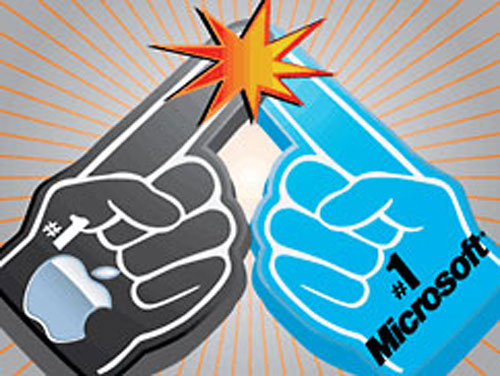Apple’s new iPhones and Microsoft’s Windows 8.1 operating system vie for top billing this week — but not in a good way
Apple and Microsoft, the two undisputed giants of the tech industry, have been dishing out dollops of disappointment to users. Reaction this week to the new iPhones ranged from “underwhelmed” to “bored,” while Windows 8.1 was likened to a “big, ugly black cloud.” Any minute now, I expect the folks in Cupertino and Redmond to begin channeling Rodney Dangerfield and kvetch: “I get no respect.”
Pundits strove to outdo themselves when describing their ennui with Apple’s announcements. CNN Money jeered at the “iPhlop” and InfoWorld’s own Robert X. Cringely described reaction to Apple’s special event (“only this time somebody forgot to pack the ‘special'”) as “the sound of 10 million bloggers all yawning at once.”
Cooler heads, such as InfoWorld’s Galen Gruman, pointed out that disappointment with the new iPhone is really a commentary on smartphone innovation in general. The challenge facing smartphone makers, Gruman writes, is that “there’s not a lot any company can do with the smartphone hardware any more. They’ve become like PCs — basically the same each time, with the usual faster hardware and some minor improvements (like the fingerprint scanner in the iPhone 5s) every year — nothing to stop the presses about…. The changes are getting incremental or superficial.”
Pundits are angry at Apple, Gruman says, for not reinventing the smartphone. And while he concedes that “the iPhone 5c is just the iPhone 5 in a colorful new case” and “the iPhone 5s is a souped-up iPhone 5,” there is real innovation that many industry watchers have overlooked or undervalued — namely Apple’s move to a 64-bit processor. The A7 chip “sets the stage for Apple devices to replace PCs in the next few years.” While short-term gains from 64-bit computing will be minimal, as most apps today are 32 bit, “ultimately, the bulk of the smartphone market is expected to move to 64-bit chips, and Apple’s move positions it for the future.”
Another underappreciated innovation is Apple’s introduction of the M7 motion coprocessor, which according to Gruman really marks Apple’s entry into the wearables market. The M7 “says clearly that Apple believes in movement-tracking as a core capability … Apple is clearly building a strategy for pervasive wearables … and the M7 is first visible ripple at Apple.”
Apple may have let down fanboys who hoped for news of iTV, iWatch, or some other glimmer of the Steve Jobs glory days, but contrast that to the world of ongoing hurt in the Windows community. Although Microsoft managed to temporarily assuage the wrath of developers and IT pros by backtracking and deciding to grant them access to the latest Windows 8.1 build — a move IDC analyst Al Gillen called a “no-brainer” because that community is “one of Microsoft’s points of entry to corporate IT” — it burned through that good will at record pace by botching yet another Windows Update. As InfoWorld’s Woody Leonhard writes, “It must be Wretched Wednesday — the day after Black Tuesday.”
It took Microsoft more than 14 hours after there were verified reports of problems on Microsoft’s own TechNet and Answers forums before it fessed up and pulled one of the problematic patches. And users “didn’t get an official explanation until 24 hours or more after the bad patch hit.”
Microsoft’s got a real problem with deafness to users’ complaints these days, particularly when it comes to reaction to Windows 8.1. Leonhard pulls no punches in his Windows 8.1 review: “New version, same mess.” The latest build, he says, “changes a bit of eye candy and dangles several worthwhile improvements — but hardly solves the underlying problem. Touch-loving tablet users are still saddled with a touch-hostile Windows Desktop, while point-and-clickers who live and breathe the Windows Desktop still can’t make Metro go away.”
After hammering Microsoft (yet again!) for the “lamentable changes related to Smart Search, Libraries, and SkyDrive,” Leonhard does find something for developers to cheer: “Lest you think Windows 8.1 is all glitz and gloom, there’s a silver lining on that big, ugly black cloud. Over on the developer side, Microsoft has finally — finally! — relaxed many of its stupid rules for Metro app development. As a result, we may actually see some usable Metro apps appearing in the next few months.”
But the bottom line on Windows 8.1, according to Leonhard, is that “if you’re using Windows 8, plan on upgrading to Windows 8.1 — but give it a month or two for all the creepy-crawlies to shake out…. If you’re using Windows XP or Windows 7 (still my favorite OS), there’s nothing to see here. Move along.”
And that’s where Apple’s and Microsoft’s tales of disappointment really diverge. For all the panning the new iPhones took in the media, you can safely predict Apple will sell a ton of them. But uptake of Windows 8 is not so readily assured. The question is: Will Microsoft under new leadership continue to turn a deaf ear to users or bounce back from the Windows 8 debacle? As Leonhard says, “Nobody knows what the next version of Windows will look like or when it will appear, but it’s a sure bet it’s going to be quite different from Windows 8.1 — at least, one can hope.”
Hope is one commodity never in short supply among Apple users, who are already putting this week’s lackluster event behind them and looking ahead to the Next Big Thing. CNet and others eagerly speculate that “if the rumors are true, an October surprise may be in the offing from Apple … and the instant it introduces a new platform, the excitement will be back.”
Or as Martin Luther King, Jr. once said, “We must accept finite disappointment, but never lose infinite hope.”
Source: www.infoworld.com





